
The Ristone Holdings agricultural group is completing the harvest on an area of about 38,000 hectares and is simultaneously finishing sowing winter crops, for which it has allocated 26,800 hectares, the agricultural holding’s press service reported on Facebook.
“Sunflowers were the main crop of this year’s harvest. As planned in the spring, 29,000 hectares were sown with this strategically important and highly profitable crop. As of today, the sunflower harvest from these areas has been completely completed,” the agricultural group stated.
In addition, the holding’s farmers harvested 5.5 thousand hectares of corn and 350 hectares of soybeans, thus completing the 2025 harvesting campaign.
In parallel with the harvest, Ristone Holding farms prepared the soil for the 2026 sowing campaign. The fields were plowed for winter crops, which is a key agronomic measure for moisture accumulation, soil structure improvement, and weed and pest control. The final stage of the autumn work was the sowing of winter crops, which is currently in its final stages.
For the 2026 harvest, the agricultural holding sowed 23,000 hectares with winter wheat and 3,800 hectares with winter rapeseed.
The Ristone Holdings group of companies is a vertically integrated agricultural holding company, which includes: Dnipromlyn LLC, Bakery No. 10 LLC, Orilsky United Elevator LLC, Agrofirma Orilskaya LLC, Agroalliance LLC, Agrofirma Victoria State Enterprise, Agrofirma im. Gorkogo LLC, Zlagoda Agricultural Production Cooperative, etc.
Ristone Holdings cultivates 65,800 hectares in the Dnipropetrovsk, Kharkiv, and Zaporizhzhia regions. It is engaged in the cultivation of grain and industrial crops, animal husbandry, production, and wholesale and retail trade in agricultural products, including flour, bread, bakery products, etc.
The founder and chairman of the supervisory board of Ristone Holdings is Vadym Nesterenko.
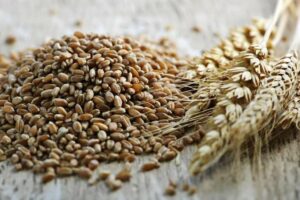
As of October 24, farmers harvested 37.560 million tons of grain and legumes from 8.400 million hectares, which is 73% of the area sown with these crops, according to the Ministry of Economy, Environment, and Agriculture on its website.
Last year, on the same date, 45.1 million tons of grain were harvested from 9.7 million hectares, meaning that this year’s figures are 16.7% and 13.4% lower, respectively, mainly due to the later start of the corn harvest.
As noted by the Ministry of Economy, 7.71 million tons of corn have been harvested from 1.31 million hectares, while last year at approximately the same date, 15.4 million tons were harvested from 2.7 million hectares.
As for wheat, its harvest is slightly higher than last year’s – 22.80 million tons from 5.05 million hectares compared to 22.30 million tons from 4.9 million hectares, while barley is slightly lower – 5.37 million tons from 1.35 million hectares compared to 5.50 million tons from 1.41 million hectares.
This year’s pea harvest is significantly higher – 662,300 tons from 271,500 hectares compared to 465,300 tons from 212,200 hectares last year, while buckwheat and millet are still significantly lower – 83,300 tons versus 126,900 tons and 61,500 tons versus 159,500 tons, respectively.
The harvest of other cereals and legumes this year reached 876,700 tons from 317,600 hectares as of October 24, while last year it amounted to 1.1 million tons on the same date.
It is noted that among the leaders are, in particular, the Odesa region – 3.80 million tons from an area of 1.14 million hectares, Poltava – 2.86 million tons from 603.3 thousand hectares, Khmelnytskyi region – 2.55 million tons from 365,200 hectares, and Chernihiv region – 2.52 million tons from 407,700 hectares.
The harvest of wheat, barley, and peas has been completed, according to the Ministry of Economy.
As for oilseeds, the rapeseed harvest has already been completed, and it turned out to be only slightly less than last year’s – 3.32 million tons against 3.5 million tons from almost equal areas of about 1.3 million hectares.
However, the harvest of soybeans and sunflowers is still ongoing, and there is a significant lag: 3.50 million tons of soybeans have been harvested from 1.52 million hectares, compared to 5.6 million tons from 2.5 million hectares on the same date last year, while sunflower seeds – 7.84 million tons from 4.24 million hectares compared to 9.5 million tons from 4.6 million hectares.
In addition, sugar beet harvesting is also lagging behind: 5.64 million tons have been harvested from an area of 108,100 hectares, compared to 8.3 million tons from 170,600 hectares on the same date last year.
According to the Ministry of Economy, sunflowers have been harvested from 82% of the sown area, soybeans from 70%, and sugar beets from 55%.
In its Inflation Report published at the end of July, the National Bank of Ukraine lowered its forecast for this year’s grain harvest from 61.7 million tons to 57.9 million tons, and for oilseeds from 22 million tons to 21 million tons.
The NBU recalled that last year, the grain harvest in Ukraine fell to 56.2 million tons from 59.8 million tons in 2023, while oilseeds fell from 21.7 million tons to 20 million tons.
According to forecasts by Deputy Minister of Economy Taras Vysotsky, this year’s grain harvest will be around 56 million tons, the same as last year.
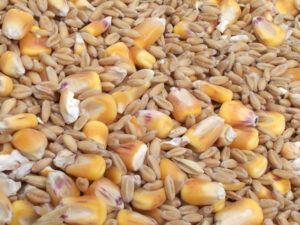
As of October 17, farmers harvested 34.749 million tons of grain and legumes from 7.979 million hectares, which is 69% of the area sown with these crops, according to the website of the Ministry of Economy, Environment, and Agriculture.
Last year, on the same date, 42.8 million tons of grain were harvested from 9.4 million hectares, meaning that this year’s figures are 18.8% and 15% lower, respectively, mainly due to the later start of corn harvesting.
As noted by the Ministry of Economy, 4.91 million tons of corn have been harvested from 895,200 hectares, while last year at around this date, 13.2 million tons were harvested from 2.4 million hectares.
As for wheat, its harvest is slightly higher than last year’s – 22.78 million tons from 5.05 million hectares compared to 22.30 million tons from 4.9 million hectares, while barley is slightly lower – 5.36 million tons from 1.35 million hectares compared to 5.50 million tons from 1.41 million hectares.
This year’s pea harvest is significantly higher – 658,300 tons from 271,100 hectares compared to 465,300 tons from 212,200 hectares last year, while buckwheat and millet are still significantly lower – 82.4 thousand tons versus 124.8 thousand tons and 59.9 thousand tons versus 158.9 thousand tons, respectively.
The harvest of other cereals and legumes this year reached 896,200 tons from 304,700 hectares as of October 17, while last year it amounted to 1 million tons on the same date.
It is noted that among the leaders are, in particular, the Odesa region – 3.78 million tons from an area of 1.13 million hectares, Poltava – 2.66 million tons from 564,200 hectares, Khmelnytskyi region – 2.48 million tons from 356,900 hectares, and Vinnytsia region – 2.45 million tons from 440,100 hectares.
The harvest of wheat, barley, and peas has been completed, according to the Ministry of Economy.
As for oilseeds, the rapeseed harvest is only slightly less than last year’s – 3.31 million tons compared to 3.5 million tons from almost equal areas of about 1.3 million hectares.
However, the harvest of soybeans and sunflowers is still ongoing, and there is a significant lag: 3.08 million tons of soybeans have been harvested from 1.34 million hectares, compared to 5.2 million tons from 2.3 million hectares on the same date last year, while sunflower seeds – 7.19 million tons from 3.91 million hectares compared to 9.3 million tons from 4.5 million hectares.
In addition, the harvest of sugar beets is also lagging behind: 4.72 million tons have been harvested from an area of 90,000 hectares, compared to 6.5 million tons on the same date last year.
According to the Ministry of Economy, sunflower has been harvested from 76% of the sown area, soybeans from 62%, and sugar beets from 45%, while rapeseed harvesting has been completed.
In its Inflation Report published at the end of July, the National Bank of Ukraine lowered its forecast for this year’s grain harvest from 61.7 million tons to 57.9 million tons, and for oilseeds from 22 million tons to 21 million tons.
The NBU recalled that last year, the grain harvest in Ukraine fell to 56.2 million tons from 59.8 million tons in 2023, while oilseeds fell from 21.7 million tons to 20 million tons.
According to forecasts by Deputy Minister of Economy Taras Vysotsky, this year’s grain harvest will be around 56 million tons, the same as last year.
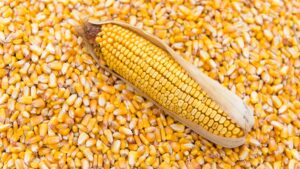
Agrotrade’s agricultural holdings in Sumy and Chernihiv regions have begun harvesting corn from more than 13,000 hectares, with 5% of the area already threshed, according to its press service on Facebook.
The agricultural holding specified that the fields of Chernihiv region are currently showing the best yield — 114% of the planned indicators.
“At the moment, good yields are observed thanks to the correct selection of hybrids for the conditions of the year, timely feeding, and care for the crops. The high-quality work of modern equipment during sowing was also of great importance. For this, we used our new Fendt Momentum seeders with a liquid fertilizer application system,” said Gennady Maly, chief agronomist at Agrotrade, in a press release.
The structural divisions of the agricultural holding are harvesting during periods without precipitation. The campaign is planned to be completed by mid-November, according to the report.
The Agrotrade Group of Companies is a vertically integrated holding company with a full agro-industrial cycle (production, processing, storage, and trade in agricultural products). It cultivates more than 70,000 hectares of land. Its main crops are sunflower, corn, winter wheat, soybeans, and rapeseed. It has its own network of elevators with a one-time storage capacity of 570,000 tons.
The group also produces hybrid seeds of corn, sunflower, barley, and winter wheat. In 2014, a seed plant with a capacity of 20,000 tons of seeds per year was built on the basis of the Kolos seed farm (Kharkiv region).
The founder of Agrotrade is Vsevolod Kozhemyako.
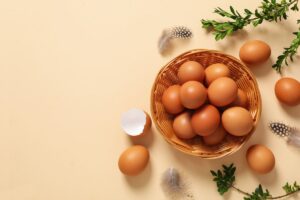
Ukraine has the potential to expand bilateral agricultural trade with the US, particularly in the export of meat, eggs, corn, and queen bees, according to the State Service for Food Safety and Consumer Protection following a working visit to the US by the agency’s head, Serhiy Tkachuk.
The State Service noted that during the visit, Tkachuk held meetings with representatives of three departments of the US Department of Agriculture.
Together with the USDA Foreign Agricultural Service (FAS), the parties discussed increasing bilateral trade in agricultural products. Ukraine has the potential to replace Russian and Chinese products on the American market, the agency assured. Particular attention was paid to opening the US market for Ukrainian poultry and eggs.
Negotiations with the USDA Food Safety Inspection Service (FSIS) focused on access to the US market for Ukrainian poultry meat and eggs. The State Service of Ukraine for Food Safety and Consumer Protection has already provided all the necessary information and expressed its readiness to undergo inspections, including online. This practice has been successfully applied in cooperation with the United Kingdom, Canada, and the EU.
The Ukrainian side emphasized the importance of moving forward with applications for the export of pork and beef, and the FSIS confirmed its readiness to begin technical consultations.
The meeting with the USDA Animal and Plant Health Inspection Service (APHIS) was devoted to the epizootic situation, the procedure for assessing the status of diseases, and inspections.
In addition, the meetings discussed the prospects for exporting Ukrainian corn and queen bees. The American side positively assessed the dynamics regarding corn and promised to consider the issue of bees in the near future.
“These dialogues confirm that even in times of war, the Ukrainian agricultural sector remains a reliable and promising partner. We feel the support of our American colleagues and their willingness to move forward in opening up new opportunities for Ukraine,” concluded the head of the State Food and Consumer Service.
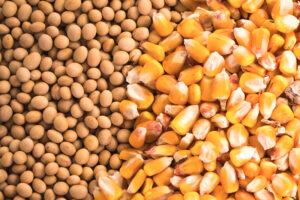
One of Ukraine’s largest grain market operators, Nibulon, has begun harvesting late grain crops in the Cherkasy and Khmelnytsky regions, according to a Facebook post by the grain trader’s press service.
According to the report, the Chyhyryn branch in the Cherkasy region, where corn is harvested on an area of 9,500 hectares, was the first to start harvesting late grain crops in the 2025 season.
“Despite the difficult weather conditions during the growing season, corn in this region yielded 7 tons per hectare. The total planned gross corn harvest for the holding is 180,000 tons. The total area under this crop this year is 22,577 hectares. As of today, the first 2,000 hectares have been threshed. Eight combines and 70 grain trucks are involved in the corn harvest,” the agricultural holding said.
In addition, the soybean harvest has begun in the Khmilnytskyi and Kamianets-Podilskyi clusters. The first 500 hectares have been threshed with a yield of 3.2 tons. In total, they have 9,600 hectares to harvest. Twelve combines and 40 grain trucks are working on threshing this crop.
Immediately after harvesting, Nibulon will cultivate the soil for sowing in 2026. The priority is strip-till and deep loosening.
“Overall, 2025 has been a difficult year for agriculture. This year’s weather, in particular the lack of productive rainfall in the central and especially southern regions of Ukraine, did not contribute to record harvests. Since the beginning of the year, only 220 mm of precipitation has been recorded in the Chyhyryn area, and it should be noted that a significant part of it was not productive and was not effective in fully meeting the moisture needs of corn, especially at critical stages of plant development,” the agricultural holding noted.
Nibulon was able to achieve a stable harvest despite the moisture deficit by implementing a set of resource-saving agricultural technologies, including economical soil cultivation, adherence to early sowing dates, and the competent selection of corn hybrids with FAO 220–250, which are highly drought-resistant and release moisture quickly during ripening.
Nibulon LLC was established in 1991. Before the Russian military invasion, the grain trader had 27 transshipment terminals and complexes for receiving agricultural crops, a capacity for one-time storage of 2.25 million tons of agricultural products, a fleet of 83 vessels (including 23 tugboats), and owned the Mykolaiv Shipyard.
Before the war, Nibulon cultivated 82,000 hectares of land in 12 regions of Ukraine and exported agricultural products to more than 70 countries around the world. In 2021, the grain trader exported a record 5.64 million tons of agricultural products and supplied record volumes to foreign markets in August (0.7 million tons), in the fourth quarter (1.88 million tons), and in the second half of the year (3.71 million tons).
The grain trader is currently operating at 32% of its capacity, has created a special unit for demining agricultural land, and has been forced to move its central office from Mykolaiv to Kyiv.